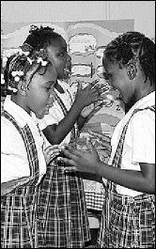The G4 Literacy Test - focal point of primary education
Published: Wednesday | June 17, 2009

These students of the John Rollins Success Primary School took a break from viewing displays at the school's reading marathon in February. - File
The goal of Jamaica's primary education is to equip grades one to six students with:
1. Minimum acceptable literacy and numeracy competencies.
2. Requisite knowledge, skills and competencies to access secondary education.
3. Positive values and attitudes towards self and others.
Roughly 298,000 students fall in this age cohort and are registered in state-run primary, all-age, primary and junior high schools and in private institutions.
Literacy testing
In an effort to ascertain these students' attainment in literacy, the Ministry of Education administers a Grade Four Literacy Test to students in grade four annually, through its National Assessment Programme. The test takes into consideration international standards for attainment of basic literacy, which includes: the ability to identify, understand, interpret, create, communicate, compute and use printed and written materials associated with varying context.
It comprises three sections, namely:
Word recognition - 40 items to match picture with word or word with picture.
Reading comprehension - 30 questions on narrative, expository texts and formatted materials, such as schedules and documents.
Writing task - Filling out one form and doing one piece of extended writing.
Students who perform at an accepted level in all three sections of the test are classified as achieving 'mastery', while all other students fall in the 'non-mastery' category.
Plan bearing fruit
The results over the last 10 years indicate that there is a steady increase in the number of students achieving mastery on the test at the initial sitting and also after a three-week intensive intervention programme. In 1999, for example, 52 per cent of students mastered at the first sitting and five per cent at the second administration, bringing the total per cent mastery to 57 per cent.
Sixty-three per cent of the students who sat the test in 2004 achieved mastery at the first and second administration. The 2008 results indicate that 71 per cent achieved mastery at the first sitting and an additional 10 per cent after the intervention, bringing the total to 81 per cent mastery.
The new policy direction of the Ministry of Education is that no child will be allowed to sit the GSAT until he or she is certified as literate.
As a result:
The Grade Four Literacy Test will be externally administered.
Test papers will be marked and scored externally under the supervision of the Student Assessment Unit and the National Literacy Team.
Individual student report indicating mastery level for each subtest and overall mastery will be provided.
Each child will have four opportunities to be certified:
a. Once in grade four (June)
b. Twice in grade five (December and June)
c. Once in grade six (December)
This means that the child who is at present in grade four will sit the test for the first time tomorrow, Thursday, June 18. If this child falls in the 'non-mastery category', he will move on to grade five, but will be allowed to sit a supplementary test in December of this year. In June 2010, when the new cohort of frade four students are sitting the test, this same child will have a third opportunity to do so. The fourth opportunity will be in December 2010, at which time the child would be a grade-six student. He may be provisionally registered for the Grade Six Achievement Test (GSAT), but will only be allowed to sit the exam if he achieved mastery on the supplemental Grade Four Test.
Special provision
Special provision will be put in place for the grade-six students who after four attempts have still not mastered the Grade Four Literacy Test. These include:
1. Remaining in grade six for one additional year.
2. Being placed in selected learning centres with support from special educators.
3. Exposure to a specially designed curriculum and intervention programme.
The Ministry of Education is committed to providing information to stakeholder on the nature and quality of the support that will be offered to children who show a pattern of underachievement. Literacy specialist, special educators and the officers in each region will continue to intensify the support offered to school leaders and classroom teachers and will make themselves available for individual and group conferencing with parents and caregivers.
Contributed by the Ministry of Education. Send your comments to columns@gleanerjm.com


















